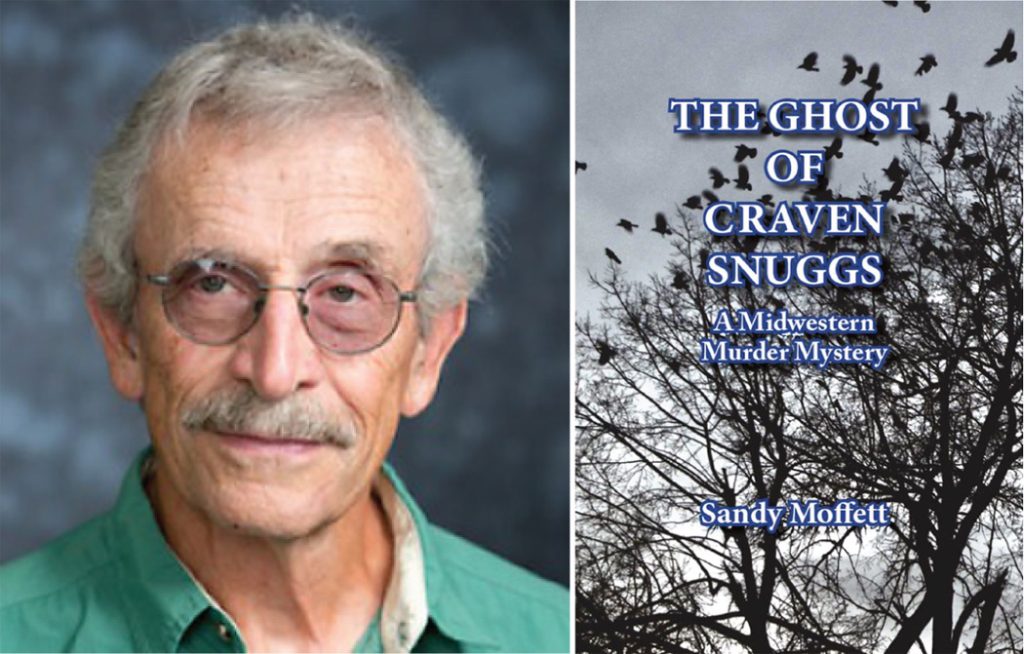
A few years back, our regular books and literature columnist Rob Cline reviewed a delightful collection of short stories titled Coming Clean by Betty Moffett. Betty—and shortly thereafter her husband, Sandy (Alexander)—became regulars at the monthly Thirsty Word reading series I host, driving all the way down from Grinnell to share their creative writing with a Fairfield audience. Not to embarrass them, but they’re some of the finest people you’ll meet. And they both have a knack for scrumptious storytelling.
This past October, Sandy Moffett’s first novel, The Ghost of Craven Snuggs, was published by Ice Cube Press, addressing —in the style of a murder mystery—a subject that has had Iowa communities on a tightrope walk for some time now. Here are the author’s responses to my curiosities about his book and his craft.
You’re a man of many talents! In addition to teaching acting, directing, and American theater at Grinnell College since 1971, you wear multiple other hats: conservationist, musician, songwriter, short-story writer, and now novelist. What was the catalyst for this first novel?
It’s hard to give a short answer. I fell in love with the Iowa landscape of the ’70s when I first moved here—smaller farms with people living on them, weedy fencerows, marshy draws, and small timbers—so I never was a fan of big ag. I have opposed CAFOs [concentrated animal feeding operations] ever since they began to proliferate in the late ’90s.
After I retired from teaching, I was elected to the Poweshiek County board of supervisors, and I began to see the harm these factory farms were doing to the communities in our county. I also saw how local government was prohibited by the state from having any control over the density and location of these operations. Our hands were tied when trying to end the deteriorating quality of life in areas where these CAFOs were being built. State regulations were too weak to be of any help. I was writing short stories and essays, a couple of which had to do with the environment, “It’s Not Just the Smell,” in the (sorely missed) Wapsipinicon Almanac, volume 20, and “Dead Gun,” in Rootstalk, volume 3, issue 2. Perhaps the isolation and time of the pandemic made me wonder if I could write a novel, and the subject had been in my head for years. So, it happened. I must add it was spurred on by the Thirsty Word.
Your book gives us a lot to chew on. It touches on the serious state of Iowa’s environment and some of the complicated big ag politics at hand—yet manages some welcome levity: Three-Stooges-style humor, some delicious romance, and downright lyrical passages that speak to your reverence for the natural world. What was your process of marrying all of these elements together?
I didn’t want to write a 200-page sermon or diatribe. I thought I might be able to say something serious and have a good time with it along with my readers. Also, the characters turned out to be funny, each in their own way. The only ones that weren’t were murdered. As for lyrical passages . . . I needed to show what it is I want to save. For the most part, I was just describing places I have been. Delicious romance? We need all of that we can get.
Are there other writers you’re influenced by?
I worship at the feet of Carl Hiaasen as a satirist, mystery writer, environmentalist, and fighter.
Will you tell us a little more about your conservation work in Poweshiek and Mahaska counties?
We moved to a farmhouse after we came to Iowa and have only recently relocated to town. We had four acres on which we kept two horses. Little by little we were able to buy some land—40 acres 12 miles south, then the 125-acre farm around us. Gradually all of this has been restored to native prairie and the 125 is in a conservation easement with the Iowa Natural Heritage Foundation. Back in the late 1990s, a group of 10 families here in Grinnell formed an LLC and bought 640 acres of really rough and wonderfully diverse land in Mahaska County in order to manage it for wildlife habitat. The shareholders are a varied group, two families now live out of state, and others seldom visit the land but remain supportive.
For me, it is a passion, and a week never passes that I don’t go out there to do some work or hunt or just walk around. It is also in a reserved life estate, which means that it is essentially the property of the corporation, but when the current shareholders are dead or no longer interested in the maintenance, it goes as a gift to the Iowa Natural Heritage Foundation.
Was there something you came across in your research for this novel that surprised you? Something you learned that really stuck with you?
The size and rapaciousness of the big-ag complex. Now they, these same people, want to carve up our ground and honeycomb our state with pipelines (subject for another novel).
How has the reception been to Craven Snuggs? Have you gotten any responses you didn’t expect?
The reception has been great, better than I ever expected. I’m a little surprised no one has tried to punch me out. Yet.
What’s next? Got any new projects in the works?
I am working on another novel, Emmi. Same location, some of the same characters. Maybe a little gentler than Craven, but not much.
